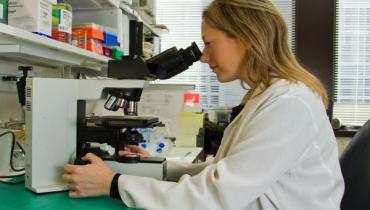What is endometriosis?
Endometriosis occurs when cells similar to the ones in the lining of the womb (uterus) are found elsewhere in the body. These cells can grow and change in response to hormones in the menstrual cycle, this can cause inflammation, pain and scar tissue.
Endometriosis is most commonly found on the lining of the pelvis (peritoneum) and may occur in the ovaries and involve other pelvic organs, like the bowel or bladder. Less commonly, endometriosis can also be found outside the pelvis, such as in the chest.
Endometriosis affects 10% of women and those assigned female at birth from puberty to menopause, although the impact may be felt for life. In the UK, that’s over 1.5 million from all races and ethnicities living with the condition.
Types of endometriosis
There are four different types of endometriosis and it’s possible to have more than one type. The different types refer to the location, amount and depth of endometrial lesions.
Peritoneal (superficial) endometriosis - is found mainly on the pelvic peritoneum – a thin film that lines the inner surface of the pelvis and surrounds the pelvic organs.
Ovarian endometriosis (endometrioma) – is when endometriosis cysts are found in the ovaries.
Deep endometriosis - is found in locations such as the bladder, bowel and recto-vaginal septum (tissue separating the vagina and the rectum). The lesions of endometriosis are at a deeper level than peritoneal (superficial) endometriosis.
Extra-pelvic endometriosis - is when endometriosis is found outside of the pelvis, such as the thorax (chest) and caesarean scars.
A related condition is adenomyosis, where cells similar to the ones in the lining of the womb grow within the muscle of the womb wall. Adenomyosis also responds to the hormones in the menstrual cycle and affects 10% of women and those assigned female at birth. You can have only endometriosis or adenomyosis, although it’s quite common to have both.
Endometriosis symptoms
Symptoms vary from person to person, some may have severe and debilitating symptoms, others may have no symptoms at all. Symptoms are not always related to the location, amount or the type of endometriosis. It’s also important to know that endometriosis symptoms can also be symptoms of other health conditions. We recommend that you speak to a doctor if your symptoms are interfering with day-to-day life.
Common symptoms include:
- Pelvic pain
- Painful periods that interfere with everyday life
- Heavy menstrual bleeding
- Pain during or after sex
- Painful bowel movements/when having a poo
- Pain when urinating/peeing
- Difficulty getting pregnant – up to 70% of those with endometriosis will be able to get pregnant naturally
- Fatigue, with one or more of the above symptoms
Many with endometriosis also experience significant bloating around the time of a period. However, bloating can also be common for those without endometriosis and bloating that does not go away can be a symptom of other health conditions. Having endometriosis can significantly impact mental health and wellbeing. With treatment, many of these issues can be addressed, and the symptoms of endometriosis made more manageable. The main ways to manage and treat endometriosis are, pain management, hormone treatments and surgery. Sometimes it can take time to find a treatment that suits you and response to treatment can vary, please keep speaking to your doctor. It’s important to remember that:
- Endometriosis symptoms can also be symptoms of other health conditions.
- Endometriosis is not a sexually transmitted infection and is not contagious
- Endometriosis is not cancer
Last reviewed: November 2024
As a charity, Endometriosis UK relies on support from people like you. If you found this page helpful please consider making a donation. Thank you.










